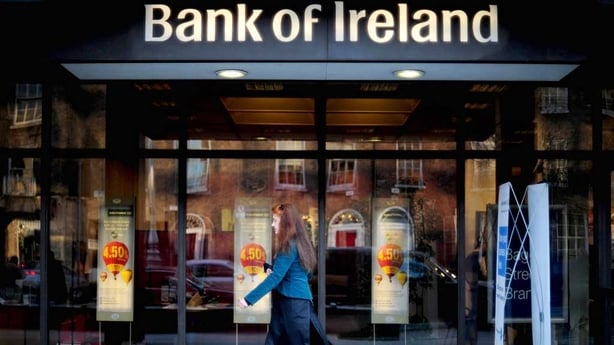Bank of Ireland is to resume dividend payments for the first time since the financial crisis and said it would not be selling off any of its non-performing loans.
The bank said that a dividend of 11.5 cents per share had been proposed for 2017.
Shares in the bank closed 3.3% lower in Dublin trade today.
Bank of Ireland today reported an underlying profit of €1.078 billion for the year to the end of December, down from an underlying profit of €1.098 in 2016.
The bank's pre-tax profit for the year fell to €852m from €1.025 billion in 2016, while its net interest income came in at €2.248 billion, down from €2.298 billion.
The lender reported a 35% reduction in its level of impaired loans, bringing the total to €4 billion at the end of the year.
Bank of Ireland said its impairment charges - money set aside to cover expected losses on loans - fell from €176m in 2016 to €15m last year.
The bank also said its new Irish mortgage lending grew by 41% and its market share now stands at 27%.
It said it expects to re-enter the Irish mortgage broker market later in 2018, which will further support growth in its mortgage business.
In her first set of results since taking over the CEO job at Bank of Ireland, Francesca McDonagh said the group had a strong performance in 2017 with all of its trading divisions profitable.
"In Ireland, we have grown our market share in residential mortgages and we have the largest market share in the business banking sector," Ms McDonagh said.
"We materially improved our asset quality, reducing our level of non-performing exposures by a further 31%," she added.
We need your consent to load this rte-player contentWe use rte-player to manage extra content that can set cookies on your device and collect data about your activity. Please review their details and accept them to load the content.Manage Preferences
On the tracker mortgage controversy, Bank of Ireland said it had incurred a charge of €170m during the year in respect of the Central Bank's review.
It said that it has now largely completed the identification process for all of its impacted customers and all impacted customers have been returned to the correct tracker rate.
"Offers of compensation and redress have been made to nine out of ten impacted customers and we are making great efforts to contact the remaining customers," the bank said.
It added that its independent appeals panels are now fully in place as an integral part of the Tracker Examination Framework. "We expect to complete all payments to customers, subject to their agreement, by the end of March 2018," it stated.
Bank of Ireland CEO ready to transform bank's culture pic.twitter.com/iYzvRu4z6q
— RTÉ Business (@RTEbusiness) February 26, 2018
Bank of Ireland CEO Francesca McDonagh also said that the bank has no plans to buy or sell non-performing loans, but may look at opportunities to grow by purchasing performing loans.
Bank of Ireland is the country's largest bank by assets. It boosted its core Tier 1 capital to 13.8% from 12.8% as of the end of September under fully loaded Basel III industry rules.
It said it expected net loan book growth in 2018 and a net interest margin, a measure of the profitability of its lending, broadly in line with the 2.24% rate at the end of 2017.
On Brexit, Ms McMcDonagh said the bank is seeing no material impact in the UK so far despite uncertainty in the economy since the vote to leave the European Union.

Bank of Ireland is the most exposed Irish lender to the British property market.
"While uncertainty remains for our UK business, we've seen nothing material today with regards to asset quality, there's nothing that gives us concern," Francesca McDonagh said.
"For our customers in Ireland, there is an element of uncertainty, particularly for smaller businesses.
"We do see that two out of three business customers intend to invest in their businesses in the coming years but some of them are applying a wait and see approach," she added.

